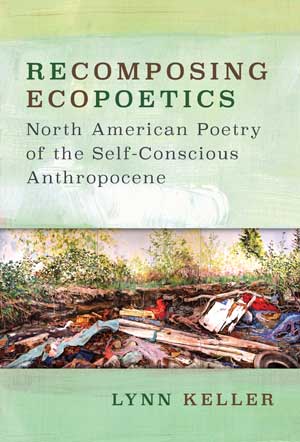
Recomposing Ecopoetics examines 21st-century poetry by a dozen Americans and Canadians who are engaging in their poems with the environmental challenges we currently face. It is, then, a work of environmental literary criticism–or ecocriticism, as it is called in academic circles.
Earlier ecocritical work on poetry focused almost exclusively on nature writing. In the contemporary American context, it attended to poems by Mary Oliver, Wendell Berry, Gary Snyder, and others that depict a seemingly timeless solace found in tranquil rural landscapes or sublime wild ones. Such poetry can connect readers with natural realms that we should indeed value—places worth preserving for their aesthetic or spiritual value as well as their biological importance. However, such poetry’s vision of an essentially unchanging natural world to which one may always escape is in crucial ways inadequate to our present situation of dramatic and often irreversible environmental transformation.
Consequently, my ecocritical study focuses not on soothing or celebratory nature writing but on poetry that reflects a keen awareness of human impact on the planet and of nature’s entanglement in culture. The poetry examined here confronts the homogenization of landscape by extraction industries across the world, explores the impact of toxic chemicals on human and non-human animal bodies, considers the emotional and intellectual challenges of coming to grips with human-induced climate change, attempts to approach the perspectives of the nonhumans with whom humans share an increasingly uninhabitable planet, reminds readers of the inequitable distribution of the benefits and costs of environmental changes associated with industrialization, or juggles a fear of impending environmental apocalypse with hope for its prevention.
Much of this poetry is experimental in its approaches to poetic form and language. Its experimentalism reflects the poets’ hopes that expanding the conventions of literary form or linguistic intelligibility may help push us toward new conceptual structures alternative to the ways of thinking that got us into the environmental mess in which we find ourselves. If I have a particular gift as a literary critic, it is in reading difficult poetry, and my hope is that this book will make difficult yet intellectually and emotionally rich poems accessible to my readers, generating in them an appreciation for this poetry that mirrors my own.
The concept of the “self-conscious Anthropocene,” introduced in the book’s title, is one of the book’s innovations and points to its larger significance. The term Anthropocene was introduced in 2000 by Nobel Prize-winning chemist Paul Crutzen and biologist Eugene Stoermer, to identify this period in the planet’s history when humans have become the predominant geological force, profoundly altering the make-up of the soil, the carbon dioxide levels in the atmosphere, the acidity of the oceans, and more. Stoermer and Crutzen dated this epoch from the Industrial Revolution. As the International Stratigraphy Commission considers whether to accept the Anthropocene as the official geological epoch we occupy (thereby declaring an end to the Holocene), there has been extensive debate among scientists about the date that should be considered its beginning; proposed originary moments range from as early as the start of agriculture to as late as 1950 and the post-atomic age of the “Great Acceleration.” Unconnected to those debates, my phrase “self-conscious Anthropocene” refers to the period since the term Anthropocene was proposed, and marks not a geological transformation but a pervasive cultural one: in the 21st century there is widespread, often anxious awareness of the scale and significance of human impact on the planetary environment. The poetry I examine reflects that important cultural phenomenon.
One benefit of the concept of the Anthropocene is its drawing together under one umbrella all the anthropogenic (human-caused) environmental changes. Its coinage accompanied an explicit call for engineers and scientists in multiple fields to come together to move industrialized societies in more sustainable directions. While Crutzen and Stoermer did not address themselves to the role of the arts and humanities, it has become clear that producing environmentally sound changes in public policy and societal behavior will require not just greater scientific understanding but also new narratives, changed imaginations, and reconsidered values. The poets featured in Recomposing Ecopoetics are among the artists responding to those crucial planetary needs.
Each chapter in the book treats work by two or three poets who address a particular issue. That issue might be conceptual—for example, the scalar challenges involved in thinking of human impact in terms of deep time and space, treated in the first chapter, or the complexity of thinking about place (a crucial term for environmentalism) in a globalized world, the focus of chapter 5. Alternatively, that issue might be much more material, as in the problems posed by the accumulation of plastics in our environment, treated in chapter 2, or social, as in the sixth and final chapter that addresses issues of environmental justice. Usually, the chapters begin with a more theoretical framing for the readings of poems that follow. I hope that the intellectually curious reader might open the book to the first page of any chapter, find herself well oriented, and be drawn in.
Since I’ve been asked to choose pages I’d like a browsing reader first to encounter, I’ll settle on the opening of the chapter on the ecopoetics of plastics, “Toxicity, Nets, and Polymeric Chains,” which discusses Evelyn Reilly’s Styrofoam (2009) and Adam Dickinson’s The Polymers (2013). My hope, again, would be that the opening pages would invite the reader to delve into the chapter. I choose that chapter because of the formal interest of the two very different volumes of poetry it examines, because of their compelling acknowledgement of the wonders as well as the dangers of plastic, and because of their inventive exposure of the endocrine disruption caused by plastics that gains too little attention in our plastic-dependent—and plastic-littered—world. Both books are likely to stretch readers’ ideas not only of poetry’s subject matter, but of what poetry looks like and the nature of poetic language.
Reilly’s book, for instance, which explores the mind-boggling scale of plastic’s endurance, contains numerous images and bits of language drawn from the Internet. Her punctuation often evokes domain names (e.g., “What the sea brought: poly.flotsam.faux.foam / &Floam®”), partly to suggest the intertwining of art with marketing and consumerism and partly to suggest the elaborate nets that bind creatures to their environments. That enmeshment makes human and nonhuman animals vulnerable to the endocrine-disrupting and otherwise toxic chemicals that leach from so many plastics—one of the concerns of the poems. In Styrofoam Reilly actively resists the emphasis on transcendence that has characterized much nature writing, believing that it draws people away from a needed focus on this world and its material conditions.
Like Reilly, Dickinson includes a number of images in his volume, but the images in The Polymers depict molecular structures, real or invented, of the polymeric chains that intrigue him. His strikingly original book is organized around the seven synthetic resins that predominate in Western petroleum culture, with the initial words of the poems’ titles determined by the chemical make-up of those resins. Believing that we are subject to a vast uncontrolled experiment being conducted by science and industry that is inadvertently rewriting the hormonal instructions governing bodily processes, Dickinson approaches his art as a responding, equally experimental but playful alternative form of science.
Poetry is not generally given much intellectual respect in North America. It tends to be thought of as potentially beautiful, moving, or uplifting, but not to be recognized as also a serious form of intellectual exploration and communication. Nor is it widely seen as a medium that might help us respond meaningfully to momentous societal challenges. My wish would be that Recomposing Ecopoetics might enhance respect for poetry as an intellectually significant art form and, in particular, generate greater appreciation of the power of experimental poetics.
In relation to our current environmental crises, I hope to contribute to people’s recognition of the important role the arts may play, working in tandem with the sciences, to help us address the extensive environmental issues we face. It remains my dream that as a society we will wake up very soon to the seriousness of those issues and respond in ways that do not repeat old patterns where inadequately considered choices have unintentional consequences that contribute to further environmental degradation. I hope that in some small way this book might enhance our care for what we arrogantly but lovingly think of as our Earth.


Lynn Keller is the Martha Meier Renk Bascom Professor of Poetry in the English Department at the University of Wisconsin-Madison. There she also directs the interdisciplinary Center for Culture, History, and Environment (CHE) in the Nelson Institute for Environmental Studies. With two colleagues she co-edits the North American Poetry Series of scholarly books published by the University of Iowa Press. Recomposing Ecopoetics: North American Poetry of the Self-Conscious Anthropocene is her fourth book on contemporary poetry.